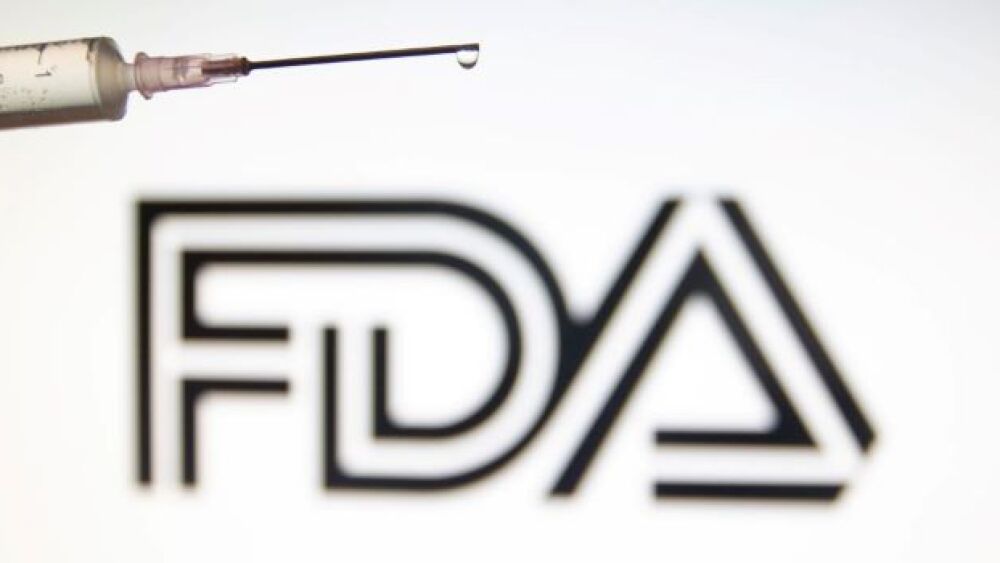The U.S. FDA issued new guidance for vaccine makers as it is preparing for the possibility of needing to approve COVID-19 booster shots against variants of the SARS-CoV-2 virus.
Nik Oiko/SOPA Images/LightRocket via Getty Images
The U.S. Food and Drug Administration (FDA) issued new guidance for vaccine makers as it is preparing for the possibility of needing to approve COVID-19 booster shots against variants of the SARS-CoV-2 virus, which causes COVID-19.
Several mutations of the SARS-CoV-2 virus, which are being called variants, are increasingly being found around the world.
The wildtype or original version came out of Wuhan, China, but there’s been increased attention and concern over variants that came out of the U.K., South Africa and Brazil. The U.K. variant is B.1.1.7, the South African is B.1.351 and the Brazilian is P.1. All three appear to be more contagious than the Wuhan strain.
Whether they are more deadly remains an open question requiring more research, although there are indications the U.K. version might be 30% more lethal than the Wuhan strain. Currently, an even bigger question is whether the existing vaccines are effective in preventing disease, preventing severe disease and death or if the virus is “slipping” the vaccines.
Pfizer-BioNTech, for example, indicated that a laboratory test suggested the South African variant might reduce protection from their vaccine by two-thirds. It has yet to be determined if the vaccine will be effective against that mutation, Pfizer stated, although the research did find the mRNA vaccine could neutralize the virus. So far, no evidence has come out of clinical trials that the South African variant decreases vaccine protection.
A similar study has suggested the same thing about the Moderna vaccine. A study showed both vaccines to be highly effective against the U.K. variant, but have less ability to neutralize the South African.
All three companies have announced they were making plans to develop a booster shot or updated vaccine. Recently, Peter Marks, the vaccine chief of the FDA, told the American Medical Association that changing the “vaccine recipe” to better target viral mutations won’t require repeating the large clinical trials.
In the new guidance, acting FDA Commissioner Janet Woodcock stated that the FDA is seeking “efficient ways to modify medical products that either are in the pipeline or have been authorized for emergency use to address emerging variants.”
The FDA also published new guidance for diagnostic assay manufactures and makers of monoclonal-antibody drugs, suggesting ways they can best adapt their products to handle mutations/variants.
Yesterday, Marks told reporters that analysis of the vaccines to determine if they prevented new strains of COVID-19 will evaluate several hundred research subjects over a couple of months. That would be faster than vaccine trials.
In a Monday statement, FDA said that “available information suggests that the FDA-authorized vaccines remain effective in protecting the American public against currently-circulating strains” of the virus. Nor did they find the new strains to affect the accuracy of diagnostic tests in a significant way.
The mRNA vaccines from Pfizer-BioNTech and Moderna are easily adaptable for new variants. “All you do,” Marks noted, “is change a computer program and the synthetic for the synthesizing portion of this, and you can change the vaccine.”
Although large-scale clinical trials would not be required, there would probably be some small clinical trials to ensure the vaccines were immunogenic against the new variants.
Other companies are also working on the variant problem. Moderna and Pfizer-BioNTech are already prepping possible updates. GlaxoSmithKline is partnering with Germany-based CureVac to develop mRNA vaccines against the variants. The companies stated, “The increase in emerging variants with the potential to reduce the efficacy of first generation COVID-19 vaccines requires acceleration of efforts to develop vaccines against new variants to keep one step ahead of the pandemic.”
One issue companies, public health officials and regulators are grappling with is determining at one point it will be necessary to shift to a new vaccine. One baseline appears to be if people who have been vaccinated with the existing vaccines begin showing up in the hospital with infections from the known variants. Just being diagnosed with a variant infection is of significantly less concern than severe disease or death. It’s possible the existing vaccines can prevent severe disease and death, but not prevent infection.
Although it’s something of a moving target as more research comes in, the Pfizer-BioNTech and Moderna vaccines appear effective against the U.K., South African and Brazilian variants; the AstraZeneca-University of Oxford vaccine appears effective against the U.K. and Brazilian variants, but at least one study suggests it has little effect against the South African variant; The Johnson & Johnson vaccine appears effective against all three, but less so against the South African and Latin American strains; the Novavax vaccine appears effective against U.K. and South African strains; it is unknown at this time, whether the Russian Sputnik V or the Chinese vaccines from CanSino Biologics or Sinovac Biotech are effective against the variants, although a study conducted in Brazil on the Sinovac Biotech vaccine demonstrated 50.4% efficacy at preventing symptomatic infections.
The best way to minimize the risk of the variants is to continue social distancing, masking, handwashing, and to distribute existing vaccines as widely and as quickly as possible.
//feedity.com/js/widget.js">





